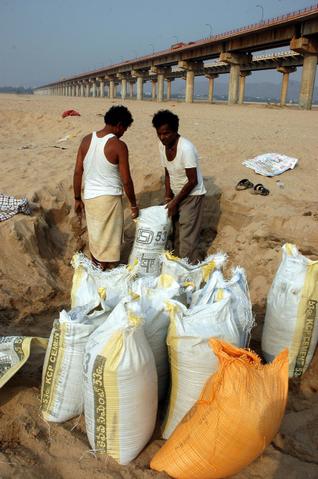 New Delhi August 5;The National Green Tribunal (NGT) ordered a nation-wide stay on sand mining in river beds without prior clearance from environment ministry on Monday.
New Delhi August 5;The National Green Tribunal (NGT) ordered a nation-wide stay on sand mining in river beds without prior clearance from environment ministry on Monday.
The interim orders came in a petition filed by the National Green Tribunal Bar Association as a reaction to the suspension of the 2009 batch IAS officer, Durga Shakti Nagpal who was overseeing a drive against illegal sand mining in her district, Gautum Budh Nagar, Uttar Pradesh.
At the same time the Union environment ministry has decided to approach the Supreme Court to clarify the process for according environmental clearances to minor mineral mining projects below 5 hectares as well as send an inspection team to Uttar Pradesh to review illegal sand mining in the state. The apex court had in February 2013 ordered mandatory green clearances from the central government for extracting minor minerals in less than 5 hectare plots.
On Monday the NGT bench headed by Swatanter Kumar ordered all state governments to respond to the petition filed before it by August 14. It said, “Besides violation of law, the mining activity is being carried out on a large scale, causing state revenue loss which may be running into lakhs of crores of rupees.”
The petition filed before the NGT by Ritwick Dutta, secretary of the bar association was specific to river Yamuna and its tributaries but the court deemed it fit to extend the case to all states. The petitioners claimed that rampant illegal mining had been undertaken in the rivers in gross violation of the Supreme Court orders. It claimed that many junior government officers and activists fighting against the environmental menace were being targeted and victimised. The petition cited the case of Ms Nagpal as well as another case of another person it claimed was killed by the sand mining mafia recently.
Pleading the case on behalf of the petitioners, senior advocate Raj Panjwani said that in-stream mining of sand and gravel had large impacts on the floodplains as well as the water table which was not being assessed at the moment.
Earlier on February 27, 2013 the Supreme Court had ordered mandatory environmental clearance from the Union environment and forests ministry for all minor mineral excavation.
In its order the Supreme Court had said, “Sand mining on either side of the rivers, upstream and in-stream, is one of the causes for environmental degradation and also a threat to the biodiversity. Over the years, India’s rivers and Riparian ecology have been badly affected by the alarming rate of unrestricted sand mining…”
The NGT decision in the case on Monday does not go beyond the pronouncement of the Supreme Court orders but only push for implementation the orders.
The apex court’s orders had been opposed by many state governments with the construction industry lobbying hard against it. This led the PMO to intervene for the brick kiln owners and the Cabinet Committee on Infrastructure also debating the issue. State governments, such as Maharashtra wrote to the Centre asking for relief from the Supreme Court orders.
The environment ministry, sources said, has decided to approach the Supreme Court to ask for a modification to its existing orders. It is likely to plead before the court to let state authorities to give environmental clearances for less than 5 hectare plots. The ministry believes that instead of dealing with thousands of clearances for the small projects it would be wiser to let the state authorities handle them under strict guidelines laid down by the Centre. The environment ministry is contending with stipulating that miners do not seek less than 5 hectare clearances in a cluster that cumulatively add up to a large area.
With the construction sector booming in the country the demand for sand has grown consistently over the past decade. According to the Indian Bureau of Mines Year Book for 2011, the states reported 49.97 lakh tonnes of sand mining which environment ministry officials off the record said was gross under-reporting.
